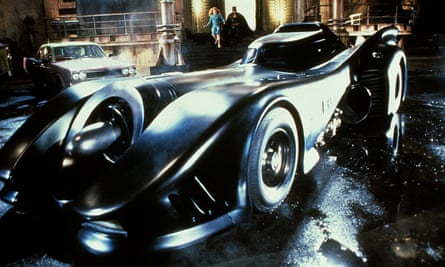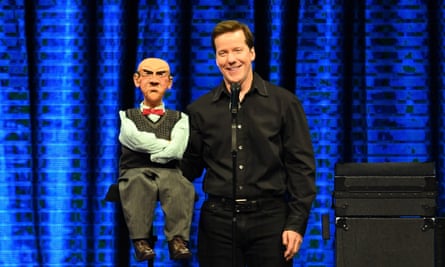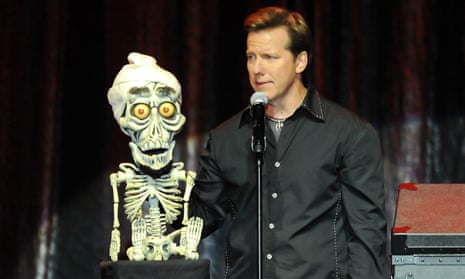Jeff Dunham is on a high. He has just played to a sell-out crowd in the Texas city of San Antonio. Any other ventriloquist would be happy with an audience of a few hundred, maybe in their wildest dreams a thousand. But Dunham and his cast of dummies pulled in a whopping 19,000 fans – and every one of them seemed to have had a riotously fun evening.
“Other comedians,” he says, “must be scratching their heads and thinking, ‘How the hell is this happening?’ It’s like aliens were looking down and saying, ‘Here’s how we’re going to screw up Earth. We’ll make a reality TV guy the president – who 60% of people hate – and then, here’s something weirder, we’ll make this ventriloquist guy so successful he sells out stadiums.’”
Dunham is no children’s entertainer. His puppets are dysfunctional, foul-mouthed and unashamedly stereotypical, from Seamus the drunken Irish baby to José the Mexican immigrant and Achmed the jihadi suicide bomber. Spurning all accusations of racism, sexism and homophobia, Dunham has become a comic phenomenon. He doesn’t just hold the Guinness World Record for most tickets sold for a standup comedy tour – 2m across 386 venues – he is also ranked by Forbes as one the highest paid comedians on the planet, up there with Jerry Seinfeld, Chris Rock and Amy Schumer.

His videos have amassed 1bn views on YouTube and his shows on NBC, Comedy Central and Netflix regularly top the ratings. So big is Dunham that last September he received a star on the Hollywood Walk of Fame. No mean feat for a man who throws his voice for a living. It’s not something that could have happened to Keith Harris and Orville the Duck.
Not since Edgar Bergen – the ventriloquist turned movie star of the 1940s – has the art form been so popular. Two of the last three winners of America’s Got Talent have been ventriloquists. There’s a new generation catching on, Dunham says: “We were the guys they shoved out on stage with the closed curtain while the headliners got ready. We were always the sideshow, the little guys, the cheap, easy entertainment.”
Not any more. Dunham’s characters revel in smirking at liberals and carving up political correctness. Alter egos There’s Walter, a retired, grumpy old man whose catchphrase is: “Shut the hell up!” And Peanut, a furry purple creature from a small Micronesian island who is hyperactively annoying. The two trot out lewd comments about women and ridicule foreign accents. Meanwhile, Seamus derides alcoholism and Achmed jokes about virgins in paradise and chides his gay son.
“People accuse me of using the puppets as a vehicle to shoot off about my own beliefs,” says Dunham, “or to tell terrible jokes that I believe in. But it’s not that at all. What the characters do is give you a licence to go a little further than you would as a human being, simply because they’re not real.”
Dunham’s audiences, judging by the myriad clips online, are mostly comprised of white Americans. They are the ones guffawing, for example, when the one-legged José Jalapeño puppet declares he can’t show his green card because he’s left it in his other leg. “Never make fun of big groups of people,” says Dunham. “Always make fun of individuals. I think that’s a good rule of thumb. I mean, if a group of people believe or think one thing, that’s their right. But if you have one idiot out of a group behaving incredibly badly, then that person deserves to be made fun of.”
British audiences will this month get a chance to decide for themselves, as Dunham arrives to play a couple of arena gigs, in Birmingham and London. What will they make, I wonder, of Dunham’s most notorious character: Achmed the dead terrorist, as his jihadi suicide bomber dummy is more properly known? A video clip – Meet Achmed – has notched up 16m views on YouTube. In it, the crowd roar with laughter when the puppet curses: “God damn it! I mean – Allah damn it! Silence, I kill you!”
The jihadi character came about, Dunham says, after the attack on the World Trade Center and the initially fruitless search for Osama bin Laden. “We didn’t know if he was dead or alive, so I thought, ‘You can’t make fun of 9/11, that will never be funny. But I will make fun of that guy, that idiot. And I know where he is – Osama bin Laden’s dead and he’s hiding out in my suitcase with all my other guys.’”
Dunham handcrafts all the puppets. Achmed appears as a charred skeleton wearing a turban, with bushy eyebrows, red eyes and a thick black beard. He’s haunting yet childishly comedic. “The way I create characters is to react to whatever is going on in the world and come up with something, someone, that I think other people will laugh at, or identify with.”
Does he ever worry he might offend people? Dunham insists he only ever offends a “teeny bit” of people, adding that whatever he is doing to offend those “3 or 4%”, is what the other 96% are “laughing at the hardest”.
Unusually for an American comedian, Dunham backed Donald Trump in the 2016 presidential election and lampooned Hillary Clinton. Trump, he thought, had the business acumen to take the US forward while most people only favoured Clinton because they thought it was “time” for a woman to be president. “You wanna punch [those voters] in the face,” he told one radio host in 2015.

Dunham claims to have become more sensitive to criticism of late “because it’s gotten so much worse”. He concedes, too, that some of the material he performed in the past now makes him “cringe a bit”. But he is otherwise unrepentant. “You don’t want to lose your edge either, that’s another fine line.”
Adopted by a devout Presbyterian Texas family in the 1960s and raised as an only child, Dunham says he was a very average kid with bad self-esteem. “I wasn’t good at sports, I wasn’t popular with other kids. Everybody else seemed to be good at something, but I didn’t have anything.”
Things started to change at the age of eight when he found a dummy in a toy shop and learned how to speak with his lips tight shut. “Being an only child, there was nobody to tell me that what I was doing was incredibly lame,” he says. “It made kids laugh and people said it really sounded like the dummy was talking. So I thought, ‘Well, now maybe I’ve found something.’”
Dunham, now 56, has turned his art into a multimillion-dollar brand with DVDs, books, hoodies, dolls, even his own wine. Also, as a petrol nut, he’s built up a huge collection of cars, including the Batmobile driven by Michael Keaton as the Dark Knight. Restored with a Corvette engine, it is now street legal. (“I like cars that start conversations.”)

Dunham lives in the celeb-packed western suburbs of Los Angeles with his wife, a fitness model, their two-year-old twin boys – and dozens of puppets. “They’ve been my entire life,” he says. Whatever people might think of his controversial take on the world, there’s no doubting one thing: his brilliance as a ventriloquist. Over two hours, he plays more characters, often in rapid conversation with one another, than seems possible from a single human voice. All without moving his lips. “Every few minutes I pull out a different guy, a different point of view, a different conflict with me, so it’s like a little sitcom on stage that just keeps on going.”
Dunham never takes a break when he’s performing, never touches a drink, not even water. It’s to do with the speed of the show, he says, and the dialogue – but also because his hands are otherwise engaged. He has had to learn to adjust. He’s proud, he says, of taking ventriloquism to heights it has never been before.
Although Dunham doesn’t need to work any more, he’s too hooked on the buzz of performance. “It’s like jumping off a high diving board in the middle of the night with the lights off,” he says. “Then halfway down you realise you forgot to check if there’s any water in the pool.”
- Jeff Dunham’s Passively Aggressive tour plays Birmingham Genting Arena on 19 May and Wembley Arena 20 May.
